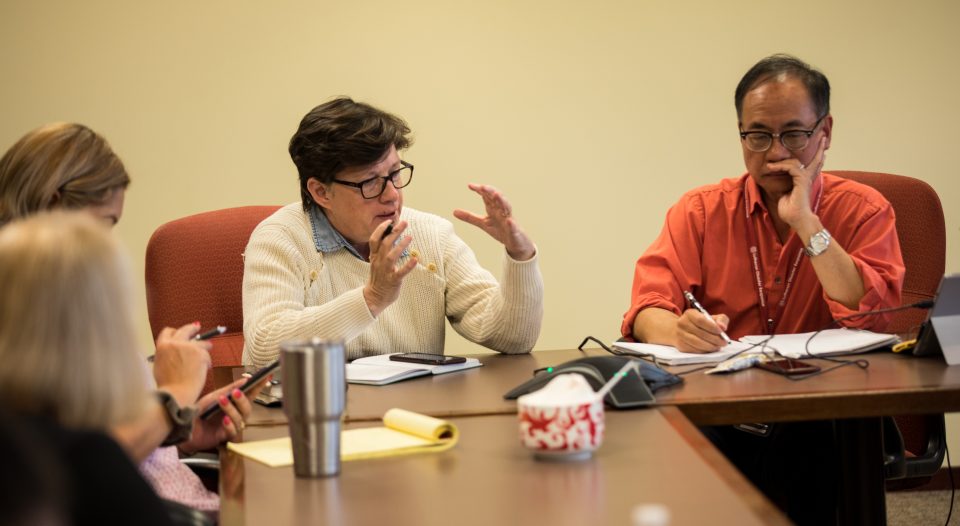Just as Hurricane Harvey long-term recovery efforts begin in Texas and Louisiana, Hurricane Irma threatens devastation as it moves toward Florida and the Carolinas. But even before the storms hit, the ELCA was mobilized and on the ground.
Bishops have maintained close communication with their congregations, pastors and deacons. Lutheran Social Service agencies have mobilized their networks. And Lutheran Disaster Response (LDR) has been in regular contact with its local affiliates.
Today, ELCA churchwide staff and representatives from partner organizations met in person and by phone to discuss collective relief efforts after Harvey, as well as what to anticipate with Irma—which has already had catastrophic effects in the Caribbean and the Virgin Islands—and how to meet the needs of the affected communities.
“This could potentially be a real blow to the infrastructure of the state and our ability to respond,” said Sam Sipes, CEO of Lutheran Services Florida (LSF). “We’re going to be dealing with a situation where everyone who’s expected to be a responder will be a victim also.”
As Irma approached, LSF, which serves nearly 500,000 people each year, has been in touch with clients to ensure that they have safety plans in place.
Opening their doors
Several staff members from the Southeastern and South Carolina synods reported that congregations and camps were planning to open as shelters or donation collection locations for evacuees. Congregations in Puerto Rico have opened their doors to congregations in the U.S. Virgin Islands.
The Southeastern Synod has been working closely with Lutheran Services of Georgia (LSG) and its own disaster response coordinators along the Georgia coast. John Moeller, CEO of LSG, shared his gratitude to ELCA congregations that have offered to shelter staff and clients as the storm possibly moves inland.
GeoRene Jones, justice and advocacy ministries coordinator for the North Carolina Synod, reported that the synod had churches setting up to be shelter sites in the Charlotte area. She also said she hears from congregation members on a nearly hourly basis asking how to help.
Several staff pointed out the importance of congregations connecting with their county emergency managers if they wish to set up as shelters.
Member response
In reporting on Hurricane Harvey recovery, Jessica Vermilyea, director of disaster response for Upbring (formerly Lutheran Social Services of the South), said, “It’s the beginning. It will be a long journey.”
The Texas-Louisiana Gulf Coast Synod will hold a Harvey workday tomorrow, with several hundred expected to serve.
LDR staff emphasized that members and congregations looking to donate supplies should make sure they are items that have been specifically requested. Affected members and congregations can register donation needs with the National Voluntary Organizations Active in Disaster.
The most effective way to donate to relief efforts for Harvey or Irma, barring a specific item request, is often through a financial gift, LDR staff said. Donation response from ELCA members so far has been “amazingly gracious,” said Daniel Rift, director of ELCA World Hunger and Disaster Appeal, adding, “One hundred percent of what comes in to us goes out into the field. This is a critical moment, and people are really rising to the occasion.”
Congregations seeking worship resources in times of hurricanes can find them here.
Church together
Michele Hilton, assistant to the bishop for administration in the Florida-Bahamas Synod, said each of the synod’s congregations along the shore had been boarded up and weekend services had been canceled. “We’ve not seen an evacuation as serious as this one,” she said.
Hilton also reported that all of the synod’s rostered ministers have shared safety plans with their congregations.
Ted Goins, president and CEO of Lutheran Services Carolinas (LSC), agreed that evacuation preparations have been well-executed. “There’s been more preparation and communication for this than ever before,” he said, citing partnership between LSC, his synod, LDR and Upbring.
“These weather events present a degree of complexity and scale that is unprecedented,” said Elizabeth Eaton, ELCA presiding bishop. “The professionalism, experience and compassion [of disaster-response staff] is remarkable. I am grateful for their efforts. But even more impressive is all of us coming together. We truly are ‘church together.’ ”





